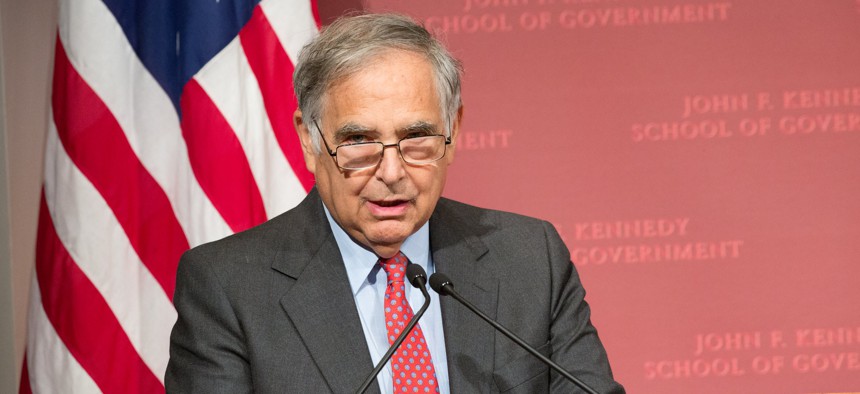Good decision, bad outcome

Harvard University Professor Richard Zeckhauser shown speaking at a memorial service on Oct. 17, 2016. Harvard University photo. Licensed under Creative Commons.
Steve Kelman shares an important lesson from the smartest person he knows.
Blog readers will not be surprised to learn that intelligence is a trait that is really highly valued among academics. So as an academic I will note that the smartest person I know is my long-time Kennedy School colleague and distinguished economist Richard Zeckhauser, a force of nature, now a youthful and still working full time 81 year-old.
We go back a long way. Zeckhauser worked to persuade me to come to the Kennedy School when I was on the job market as a new PhD. He says he first learned who I was when as a grad student himself he noticed "this skinny kid" in Harvard Yard, physically interposing himself between screaming student radicals and football players, pleading to them, "Please, be rational!" (I am not sure this incident actually took place, but it is a great story.) We are from the same home town – Great Neck, N.Y. – and his office has been right next to mine for over 40 years.
Richard is now the subject of a new book Maxims for Thinking Analytically: The wisdom of legendary Harvard professor Richard Zeckhauser, edited by another colleague, Dan Levy. The book takes a number of maxims Zeckhauser taught in his longtime course "Analytic frameworks for policy," explicates them, and presents answers from a number of Zeckhauser's colleagues to a question about how knowing the maxim has helped them with their lives.
Reading the book is like drinking from a fire hose, so I think it would be an impossible task to try to summarize the lessons from it. So what I have decided to do for this blog is to explore further one of Zeckhauser's maxims, "Good decisions sometimes have poor outcomes."
The basic idea behind this maxim is that most outcomes are partly a matter of chance. Say the weather forecast predicts a 95% chance of rain. Carrying an umbrella is a good decision (unless you don't mind the rain at all). But if it doesn't rain, carrying the umbrella around all day will turn out to be a bad outcome.
I don't remember when Zeckhauser first exposed me to this phrase, though it must have been in the context of saying to me about something that had turned out badly, "Steve, good decision, bad outcome." I got his point pretty much immediately and have used it ever since. I think in our own interactions he has used it most often in the context of faculty hiring decisions, where he would normally push for making an offer to the strongest candidate, though the very best candidate often turned down our offer.
We often mix together the quality of the decision with the quality of the outcome. But Zeckhauser notes they are separate. The quality of the decision depends on how well we have thought through the likelihoods and benefits of different alternatives, and chosen the alternative with the greatest total predicted benefit. "Good decisions are more likely to result in good outcomes than bad decisions. They cannot ensure good outcomes, but they increase the chances of good outcomes. If you consistently employ good decision processes, you will accumulate better outcomes over the course of many decisions." (Note there can also be examples of bad decision, good outcome, such as driving while dead drunk but not getting into an accident. In good decision-bad outcome we are unlucky, in bad decision-good outcome we are lucky.)
Zeckhauser gives an example of a good decision with a bad outcome from his personal life. He and his wife wanted to sell their house and buy an apartment in a nice building right next to the Kennedy School. Such apartments seldom come on the market, so when one did, they bought it. However, not long after they bought it the pandemic hit, and prices collapsed. So as it happened, they would have gotten a much better deal had they waited. But based on the information they had at the time, buying the apartment made sense.
Levy also gives a personal example. "My wife and I used Google maps to get to an attraction. It took us through a town where some streets were closed and we had to turn back and start over. It took us much longer than if we had taken the main route. Over the long run Google maps saves us time even though in this occasion it did not."
What bad things can happen if we don't realize that good decisions can have bad outcomes? From an individual point of view, not understanding this maxim produces inappropriate blaming of ourselves -- or others – for situations where we were just unlucky. And people waste time diagnosing "what went wrong" when nothing went wrong, luck was just bad. Also, concerns about regret one will feel if things turn out badly lead many simply to stick with the status quo, meaning we lose the benefits of gaining from change. Understanding that good decisions can produce bad outcomes will thus improve the average quality of our decisions.
Drink from the fire hose and read this new book. You will learn things that will help you be more effective on the job and in life.


